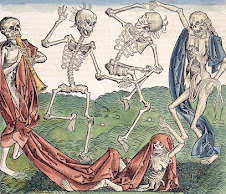Thursday, March 13, 2008
Song of Roland posts
I've also chosen to respond to both posts this week.
1) Song of Roland and Heroism-
As we discussed in class, there are as many possible answers to the question "Who's the hero" as there are characters in the text. Is it Roland, whom the text is named for and who occupies so much of the talking and thinking time of the other characters present? Is it Charlemagne (who the text was originally named for) and in whose name this great battle is fought? He is presented as the essence of the ideal ruler. Is it Oliver, whose consistent balance of wisdom and battle valor (sometimes tragically) offsets Roland's single-mindedness? All of these are possible, and I believe all of them are correct. To me, the hero in Roland is a set of ideas and values. It is an abstract rather than an individual, something readers or listeners could strive towards. But comparing that conclusion with Beowulf, we come up with the important distinction of complexity. Beowulf, though just as gory and fun, was a simpler story. Beowulf was the hero. He always made the right decision, always won the battle, always got the treasure. Roland presents a much more complicated, dramatic picture and allows us to question much more deeply the nature of medieval heroism.
2) Ganelon's Trial and Medieval Justice-
Although I would like to agree with Harris' insightful post about the growing complexity of the legal system (noticing a trend here?), I disagree that the medieval French way of dealing with the law as presented by Ganelon's trial more closely resembles modern justice systems. Charlemagne's system seems to be more heavily based on practicality and logic than on high minded conceptions of right and wrong. We as a 21st century class agree that what Ganelon did (betrayal, treachery, murder etc) was wrong. But when he is brought to trial, there is a large contingent of Roland and Oliver's home population that thinks he should just be let go. After all, they argue, Roland is dead, the damage is done and no amount of punishment is going to reverse that. It isn't logical to deprive the king of a wise advisor just because he settled an internal feud with Roland. The idea that there is such a thing as private murder is also something foreign to our system of justice. But in this world, it was a personal disagreement, personally settled and doesn't concern the larger population.
1) Song of Roland and Heroism-
As we discussed in class, there are as many possible answers to the question "Who's the hero" as there are characters in the text. Is it Roland, whom the text is named for and who occupies so much of the talking and thinking time of the other characters present? Is it Charlemagne (who the text was originally named for) and in whose name this great battle is fought? He is presented as the essence of the ideal ruler. Is it Oliver, whose consistent balance of wisdom and battle valor (sometimes tragically) offsets Roland's single-mindedness? All of these are possible, and I believe all of them are correct. To me, the hero in Roland is a set of ideas and values. It is an abstract rather than an individual, something readers or listeners could strive towards. But comparing that conclusion with Beowulf, we come up with the important distinction of complexity. Beowulf, though just as gory and fun, was a simpler story. Beowulf was the hero. He always made the right decision, always won the battle, always got the treasure. Roland presents a much more complicated, dramatic picture and allows us to question much more deeply the nature of medieval heroism.
2) Ganelon's Trial and Medieval Justice-
Although I would like to agree with Harris' insightful post about the growing complexity of the legal system (noticing a trend here?), I disagree that the medieval French way of dealing with the law as presented by Ganelon's trial more closely resembles modern justice systems. Charlemagne's system seems to be more heavily based on practicality and logic than on high minded conceptions of right and wrong. We as a 21st century class agree that what Ganelon did (betrayal, treachery, murder etc) was wrong. But when he is brought to trial, there is a large contingent of Roland and Oliver's home population that thinks he should just be let go. After all, they argue, Roland is dead, the damage is done and no amount of punishment is going to reverse that. It isn't logical to deprive the king of a wise advisor just because he settled an internal feud with Roland. The idea that there is such a thing as private murder is also something foreign to our system of justice. But in this world, it was a personal disagreement, personally settled and doesn't concern the larger population.
Subscribe to:
Post Comments (Atom)

No comments:
Post a Comment